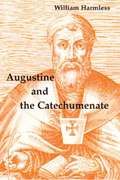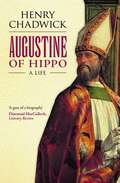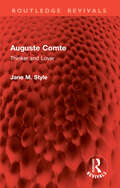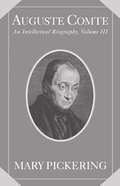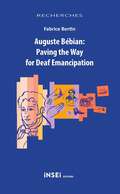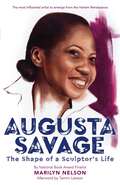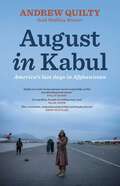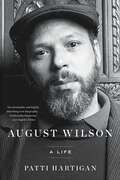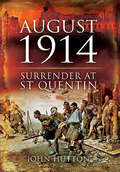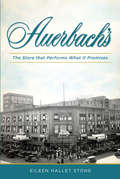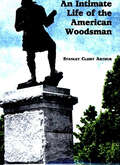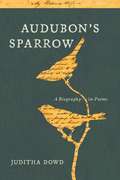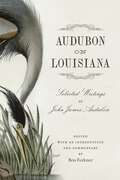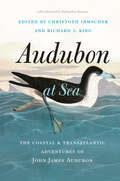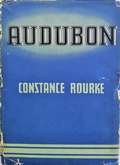- Table View
- List View
Augustine and the Trinity
by Lewis AyresAugustine of Hippo (354-430) strongly influenced western theology, but he has often been accused of over-emphasizing the unity of God to the detriment of the Trinity. In Augustine and the Trinity, Lewis Ayres offers a new treatment of this important figure, demonstrating how Augustine's writings offer one of the most sophisticated early theologies of the Trinity developed after the Council of Nicaea (325). Building on recent research, Ayres argues that Augustine was influenced by a wide variety of earlier Latin Christian traditions which stressed the irreducibility of Father, Son and Spirit. Augustine combines these traditions with material from non-Christian Neoplatonists in a very personal synthesis. Ayres also argues that Augustine shaped a powerful account of Christian ascent toward understanding of, as well as participation in the divine life, one that begins in faith and models itself on Christ's humility.
Augustine and the Catechumenate
by William HarmlessThis study examines a little-known side of Augustine: his work as a teacher of candidates for baptism. It reconstructs in vivid detail the experience of the ancient catechumenate for the better clarification and implementation of the present process.
Augustine Of Hippo: A Life
by Henry ChadwickAugustine (354-430) had a profound impact on the development of the Christian Church, sparking controversy and influencing the ideas of theologians for over fifteen centuries. His words are still frequently quoted in devotions today and his key themes retain a striking contemporary relevance--what is the place of the Church in the world? What is the relation between nature and grace? In Augustine of Hippo, the late Henry Chadwick--a renowned authority on Augustine--describes with clarity and warmth the intellectual development of this key Father of the Church. In his characteristically rigorous yet sympathetic style, Chadwick traces Augustine's intellectual journey from schoolboy and student to Bishop and champion of Christendom in a period of intense political upheaval, providing valuable insight into the progression of Augustine's ideas. With a foreword reflecting on Chadwick's distinctive approach to Augustine by Peter Brown, and a further reading list on Augustine compiled by Gillian Clark, this volume is both an essential assessment of Augustine and a final tribute to one of the great church historians of the twentieth century.
Augustine Deformed
by John M. RistAugustine established a moral framework that dominated Western culture for more than a thousand years. His partly flawed presentation of some of its key concepts (love, will and freedom), however, prompted subsequent thinkers to attempt to repair this framework, and their efforts often aggravated the very problems they intended to solve. Over time, dissatisfaction with an imperfect Augustinian theology gave way to increasingly secular and eventually impersonal moral systems. This volume traces the distortion of Augustine's thought from the twelfth century to the present and examines its consequent reconstructions. John M. Rist argues that modern philosophies should be recognized as offering no compelling answers to questions about the human condition and as leading inevitably to conventionalism or nihilism. In order to avoid this end, he proposes a return to an updated Augustinian Christianity. Essential reading for anyone interested in Augustine and his influence, Augustine Deformed revitalizes his original conception of love, will and freedom.
Auguste Comte: Thinker and Lover (Routledge Revivals)
by Jane M. StyleFirst published in 1928, Auguste Comte is a biography of the famous French philosopher Auguste Comte, the founder of the doctrine of positivism. In this book, the author traces Comte’s journey from his birth till his death. The final chapter ‘After Days’ provides a commentary on the changes the society underwent over a course of seventy years after Comte’s death. The author draws upon the works of Auguste Comte published during the period 1829–1927 to give an extensive and well researched account of the philosopher’s life and work.
Auguste Comte: An Intellectual Biography
by Mary PickeringThis book constitutes the first volume of a projected two-volume intellectual biography of Auguste Comte, the founder of modern sociology and a philosophical movement called positivism. Volume One offers a reinterpretation of Comte's "first career," (1798-1842) when he completed the scientific foundation of his philosophy. It describes the interplay between Comte's ideas and the historical context of postrevolutionary France, his struggles with poverty and mental illness, and his volatile relationships with friends, family, and colleagues, including such famous contemporaries as Saint-Simon, the Saint-Simonians, Guizot, and John Stuart Mill. Pickering shows that the man who called for a new social philosophy based on the sciences was not only ill at ease in the most basic human relationships, but also profoundly questioned the ability of the purely scientific spirit to regenerate the political and social world.
Auguste Bébian: Paving the Way for Deaf Emancipation
by Fabrice BertinPublished in French and English by INSEI Editions, Suresnes, France. English edition distributed throughout the world by Gallaudet University Press. To some, he is a mythical figure; to others, he is unknown. Auguste Bébian (1789-1839) reflects society’s ambivalence toward Deaf history: sometimes recognized, often ignored. In the wake of Abbé de l’Épée, whose name is remembered in posterity and who demonstrated that the large-scale education of Deaf people was possible, Auguste Bébian was nonetheless a key player in an unprecedented upheaval, which in many ways went beyond the educational sphere. The goal of this research on Auguste Bébian, combining biographical elements and analysis of his thinking in unprecedented ways, is not to deconstruct the myth, but rather to decipher the messages it conveys, and to understand what it tells us, indirectly, about the Deaf experience. Born in 1789 in Guadeloupe, part of the French West Indies, it was on the other side of the Atlantic Ocean, in France, that Auguste Bébian fulfilled most of his destiny. While living at the National Institution for the Deaf in Paris at the beginning of the 19th century, his daily contact with the young students made him the first known hearing person in France to achieve true mastery of sign language, the natural language of Deaf people, and a deep understanding of its inherent culture. On becoming a teacher, he constantly defended the use of sign language as a linguistic system in its own right in order to awaken the intelligence of Deaf children, to whom “we pay no more attention than to the sunlight that shines on us every day.” His numerous publications display a level of modernity rarely seen before or since. This biographical and historical study shows how the passion evinced by Auguste Bébian was a crucial link in the chain of events that led to the emancipation of Deaf people.
Augusta Savage: The Shape of a Sculptor's Life
by Marilyn NelsonA Claudia Lewis Award Winner for Poetry by the Bank Street College of Education A Black Caucus ALA Children & Young Adult Award Winner A CCBC Children&’s Choice • A CBC Teacher Favorite This powerful biography in poems tells the life of Augusta Savage, the trailblazing artist and pillar of the Harlem Renaissance. Augusta Savage was arguably the most influential American artist of the 1930s. A gifted sculptor, Savage was commissioned to create a portrait bust of W.E.B. Du Bois for the New York Public Library. She flourished during the Harlem Renaissance, and became a teacher to an entire generation of African American artists, including Jacob Lawrence, and would go on to be nationally recognized as one of the featured artists at the 1939 World&’s Fair. She was the first-ever recorded Black gallerist. After being denied an artists&’ fellowship abroad on the basis of race, Augusta Savage worked to advance equal rights in the arts. And yet popular history has forgotten her name. Deftly written and brimming with photographs of Savage&’s stunning sculpture, this is an important portrait of an exceptional artist who, despite the limitations she faced, was compelled to forge a life through art and creativity. Features an afterword by the curator of the Art & Artifacts Division of the Schomburg Center for Research in Black Culture. NAMED ONE OF THE BEST BOOKS OF THE YEAR BY Horn Book • Kirkus Reviews • School Library Journal • Bank Street College ★ "A stunning portrait of artistic genius and Black history in America." —Booklist, starred review ★ "A wonderful addition to young people&’s literature on African American artists." —Horn Book, starred review ★ "In a rich biography in verse, Nelson (A is for Oboe) gives voice to the Black sculptor Augusta Savage (1892-1962), a key Harlem Renaissance figure." —Publishers Weekly, starred review ★ "Nelson&’s arresting poetry, which is accompanied by photographs of Savage&’s work, dazzles as it experiments with form. … A lyrical biography from a master of the craft." —Kirkus Reviews, starred review ★ "A master poet breathes life and color into this portrait of a historically significant sculptor and her remarkable story." —School Library Journal, starred review
August in Kabul: America's last days in Afghanistan
by Andrew QuiltyAs night fell on 15 August 2021, the Taliban entered Kabul, capital of Afghanistan. After a 20-year conflict with the United States, its Western allies and a proxy Afghan government, the Islamic militant group once aligned with al Qaeda was about to bury yet another foreign foe in the graveyard of empires. And for America, the superpower, this was yet another foreign disaster. As cities and towns fell to the Taliban in rapid succession, Western troops and embassy staff scrambled to flee a country of which they had lost control. To the world, Kabul in August looked like Saigon in 1975. August in Kabul is the story of how America's longest mission came to an abrupt and humiliating end, told through the eyes of Afghans whose lives have been turned upside down: a young woman who harbours dreams of a university education; a presidential staffer who works desperately to hold things together as the government collapses around him; a prisoner in the notorious Bagram Prison who suddenly finds himself free when prison guards abandon their post. Andrew Quilty was one of a handful of Western journalists who stayed in Kabul as the city fell. This is his first-hand account of those dramatic final days.
August Wilson: A Life
by Patti HartiganThe &“masterful&” (The Wall Street Journal), &“invaluable&” (Los Angeles Times) first authoritative biography of August Wilson, the most important and successful American playwriting of the late 20th century, by a theater critic who knew him.August Wilson wrote a series of ten plays celebrating African American life in the 20th century, one play for each decade. No other American playwright has completed such an ambitious oeuvre. Two of the plays became successful films, Fences, starring Denzel Washington and Viola Davis; and Ma Rainey&’s Black Bottom, starring Viola Davis and Chadwick Boseman. Fences and The Piano Lesson won the Pulitzer Prize for Drama; Fences won the Tony Award for Best Play, and years after Wilson&’s death in 2005, Jitney earned a Tony Award for Best Revival of a Play. Through his brilliant use of vernacular speech, Wilson developed unforgettable characters who epitomized the trials and triumphs of the African American experience. He said that he didn&’t research his plays but wrote them from &“the blood&’s memory,&” a sense of racial history that he believed African Americans shared. Author and theater critic Patti Hartigan traced his ancestry back to slavery, and his plays echo with uncanny similarities to the history of his ancestors. She interviewed Wilson many times before his death and traces his life from his childhood in Pittsburgh (where nine of the plays take place) to Broadway. She also interviewed scores of friends, theater colleagues and family members, and conducted extensive research to tell the &“absorbing, richly detailed&” (Chicago Tribune) story of a writer who left an indelible imprint on American theater and opened the door for future playwrights of color.
August Weismann
by Frederick B. ChurchillAugust Weismann's 1892 theory that inheritance is transmitted through eggs and sperm provided the biological mechanism for natural selection. In this full-length biography, Frederick Churchill situates Weismann in the swirling intellectual currents of his day and shows how his work paved the way for the modern synthesis of genetics and evolution.
August 1914: Surrender at St Quentin
by John HuttonThe great retreat of the British Expeditionary Force from Mons in August 1914 is one of the most famous in military history, and it is justly celebrated. But not all the British soldiers who were forced back by the German offensive performed well. Two colonels, Elkington and Mainwaring, tried to surrender rather than fight on, and were disgraced. This is their story. In this compelling account John Hutton shows, in graphic detail, the full confusion of the retreat, and the dire mental state to which brave men can be reduced by extreme stress, uncertainty and fatigue. But he also describes how Elkington redeemed himself. He joined the French Foreign Legion, fought gallantly, was severely wounded and was reinstated by King George V. His is one of the more remarkable stories to come out of the Great War, as is the story of the attempted surrender at St. Quentin itself.
Auf Eierschalen Gehen
by Lucinda E. ClarkeIn einem psychisch missbrauchenden Haushalt aufzuwachsen, war nie lustig, aber dann heiratete ich einen Walter Mitty, der mich nach Afrika und in einige lächerliche und gefährliche Situationen brachte! Um zu überleben, habe ich rund um die Uhr gearbeitet. Ich unterrichtete Kinder, leitete die schlechteste Reitschule der Welt, züchtete Haustiere, machte Radiomeldungen, lebte auf einem Boot und zog zwei eigene Kinder groß. Auf der leichteren Seite habe ich einen königlichen Anlass ausgerichtet, bin mit Staatsoberhäuptern zusammengetroffen, habe Nelson Mandela interviewt und Prinz Charles die Hand geschüttelt. Zu meinem großen Erstaunen bin ich in die Medien "hineingefallen", habe zunächst für Radio und Fernsehen geschrieben, dann Regie geführt und schließlich meine eigene Videoproduktionsfirma geleitet und mehrere Preise gewonnen. Doch während all dem lauerte meine Mutter im Hintergrund und erinnerte mich stets daran, dass ich ein Versager war. Das Einzige, was mich vor der Einweisung in die nächste Nervenheilanstalt bewahrte, war mein untrüglicher Sinn für Humor.
Auerbach's: The Store that Performs What It Promises (Landmarks)
by Eileen Hallet StoneThe Store that Performs What It Promises
Audubon: An Intimate Life of the American Woodsman
by Stanley Clisby Arthur&“In recreating The American Woodsman, as Audubon so delighted to characterize himself, it is with the hope that I shall let him speak for himself, and set him wandering again in the printed pages as he did, a century and more ago, through the magnolia forests of his beloved Louisiana.&” —Stanley Clisby Arthur, from the Prologue John James Audubon was one of the greatest artists and naturalists of all time. For many years a biographical screen consisting of a heterogeneous combination of fact, fancy, and misrepresentation obscured the real Audubon. Some of the contributions to this shroud were penned by loving but misguided relatives who, through domestic partiality when writing about him, colored his life misleadingly. His own account of himself and his affairs, which was never completed and was generously edited before being given to the public, is manifestly not four-square with fact . . . for Audubon had a romantic imagination which defeats verification. This detailed biography provides an extensive look into the background of a man variously described as a dandy, an unkempt wanderer, and a gifted artist. Above all, it is clear that John James Audubon was a man of many talents, revealed here in his own words.
Audubon's Sparrow
by Juditha DowdThe life of Lucy Bakewell Audubon, wife of the painter John James Audubon, comes to life through a series of poems, letters, and journal entries. The story begins when Lucy meets Audubon, the debonair French painter and dancing-master, and follows her until the publication of Audubon's iconic Birds of America. In their gentle simplicity, the poems portray Lucy as a devoted wife, a talented teacher, and a resilient woman who managed to survive the stresses of marriage to a brilliant but impractical husband.
Audubon on Louisiana: Selected Writings of John James Audubon
by Ben ForknerAlthough we remember John James Audubon’s years in Louisiana primarily for the art he produced there, his writings reflect the profound impact the region made on him and his artistic vision, especially in his magnificent collection of paintings published as The Birds of America. In Audubon on Louisiana, Ben Forkner compiles and explains in depth Audubon’s essential writings on the region. Beginning in 1810 as Audubon arrives in the upper Louisiana Territory, and continuing as he moves into southern Louisiana ten years later (and eventually brings his wife, Lucy, to join him), Audubon’s journals, essays, and letters reveal his struggles to fill his portfolio with new watercolors, his discoveries throughout the region, and the transformative effect the area had on both his art and his life.Forkner provides a detailed introduction to Audubon’s private journal of 1820–21, the Louisiana Journal, to guide readers through this compelling document. Until now, the difficulty of comprehending Audubon’s rough English has often kept readers from fully appreciating the Journal’s significance. The volume also contains a dozen essays that Audubon penned about his experiences in Louisiana; most of these “episodes” he published in his Ornithological Biography, a massive five-volume written work that complements the visual art of Birds of America. Letters describing Audubon’s last voyage to Louisiana in 1837 followed by nine of his Louisiana bird biographies round out the collection. These original texts, augmented with Forkner’s commentary, form a magisterial work that illuminates the importance of Louisiana to Audubon’s life and art. Audubon on Louisiana deepens appreciation of one of the most significant artists—and nature writers—of the nineteenth century.
Audubon at Sea: The Coastal & Transatlantic Adventures of John James Audubon
by Subhankar BanerjeeThis one-of-a-kind, lavishly illustrated anthology celebrates Audubon’s connection to the sea through both his words and art. The American naturalist John James Audubon (1785–1851) is widely remembered for his iconic paintings of American birdlife. But as this anthology makes clear, Audubon was also a brilliant writer—and his keen gaze took in far more than creatures of the sky. Culled from his published and unpublished writings, Audubon at Sea explores Audubon’s diverse observations of the ocean, the coast, and their human and animal inhabitants. With Audubon expert Christoph Irmscher and scholar of the sea Richard J. King as our guides, we set sail from the humid expanses of the American South to the shores of England and the chilly landscapes of the Canadian North. We learn not only about the diversity of sea life Audubon documented—birds, sharks, fish, and whales—but also about life aboard ship, travel in early America, Audubon’s work habits, and the origins of beloved paintings. As we face an unfathomable loss of seabirds today, Audubon’s warnings about the fragility of birdlife in his time are prescient and newly relevant. Charting the course of Audubon’s life and work, from his birth in Haiti to his death in New York City, Irmscher and King’s sweeping introduction and carefully drawn commentary confront the challenges Audubon’s legacy poses for us today, including his participation in American slavery and the thousands of birds he killed for his art. Rounded out by hundreds of historical and ornithological notes and beautiful illustrations, and with a foreword by distinguished photographer and conservationist Subhankar Banerjee, Audubon at Sea is the most comprehensively annotated collection of Audubon’s work ever published.
Audubon
by Constance RourkeA Newbery Honor award winner book for the year 1937, Audubon is a biography of ornithologist and painter John James Audubon.
Audrey: Her Real Story
by Alexander WalkerThe definitive guide to a Hollywood legend.Few stars are as loved as Audrey Hepburn, today as much as ever. Beautiful, delicate, graceful - but always warm and natural - she stole our hearts. She was also brave, working tirelessly for UNICEF in the face of her own failing health. in this moving and heartwarming biography Alexander Walker traces the extraordinary combination of luck and talent that allowed a fragile little girl,who nearly died in Hitler's occupied Europe, to conquer, in just one year, the New York stage and the Hollywood screen. Walker analyses her ascent to power and world fame and reveals the sadness of her life: two failed marriages, a broken engagement, and the crushing disappointment that occupied her triumph in My Fair Lady. Most importantly of all, this biography reveals what no one has known until now: the truly terrifying family secret that tore Audrey's childhood apart and kept her forever silent about her parents.
Audrey: Her Real Story
by Alexander WalkerFew stars are as loved as Audrey Hepburn, today as much as ever. Beautiful, delicate, graceful - but always warm and natural - she stole our hearts. She was also brave, working tirelessly for UNICEF in the face of her own failing health. in this moving and heartwarming biography Alexander Walker traces the extraordinary combination of luck and talent that allowed a fragile little girl,who nearly died in Hitler's occupied Europe, to conquer, in just one year, the New York stage and the Hollywood screen. Walker analyses her ascent to power and world fame and reveals the sadness of her life: two failed marriages, a broken engagement, and the crushing disappointment that occupied her triumph in My Fair Lady. Most importantly of all, this biography reveals what no one has known until now: the truly terrifying family secret that tore Audrey's childhood apart and kept her forever silent about her parents.
Audrey in Rome
by Sciascia GambacciniAssembled by Audrey Hepburn's son Luca Dotti, Audrey in Rome is an intimate collection of almost two hundred candid photographs of the beloved actress and much-imitated style icon during the twenty-year period she made Rome her home.A private album of rare snapshots—many never published before—of Audrey Hepburn in her everyday life as a citizen of the Eternal City, Audrey in Rome is a treasure for every fan of her films and her impeccable, timeless style. With an introduction by Dotti that reveals Audrey's private side and three photo-filled chapters organized by decade, the book captures the actress as she strolls around the city alone and with family and friends, walks her Yorkie, Mr. Famous, has breakfast in Piazza Navona, visits the local florist, and more. The book also contains set photographs of the films she made during her Rome years (Roman Holiday, War and Peace, The Nun's Story, Breakfast at Tiffany's) and of the famous clothes and accessories that helped create her iconic look. Irresistible as the actress herself, Audrey in Rome opens the door to Hepburn's personal world.
Audrey in Paris
by Caroline YoungA charming, illustrated gift book combining two timelessly stylish subjects - Audrey Hepburn and the city of Paris.Both classic, both inimitable, both fashion icons - Audrey Hepburn and Paris are a match made in heaven. Falling in love with the city at a young age, Audrey returned to Paris again and again in some of her most celebrated films (Sabrina, Funny Face, How to Steal a Million, Charade) wearing outfits from her favourite Parisian couturier, Hubert de Givenchy, and creating some of the most significant fashion moments of the twentieth century.Audrey in Paris brings together over 100 stunning photographs of her most iconic moments in the city, from film stills and behind-the-scenes shots to candid images of Audrey enjoying the city as a visitor. The book also includes a bespoke illustrated map showing her favourite spots. While dozens of successful books on Audrey have been published, this will be the first to document her time in the city of light.Tapping into Audrey's status as a fashion idol, which spans across the generations, as well as Paris's status as the world's capital of elegance, Audrey in Paris combines the gifty charm of How to be Parisian Wherever You Are with Audrey's forever appeal as a fashion muse.Gorgeous finishes will make this a stylish gift book to be treasured for years to come.
Audrey in Paris
by Caroline YoungA charming, illustrated gift book combining two timelessly stylish subjects - Audrey Hepburn and the city of Paris.Both classic, both inimitable, both fashion icons - Audrey Hepburn and Paris are a match made in heaven. Falling in love with the city at a young age, Audrey returned to Paris again and again in some of her most celebrated films (Sabrina, Funny Face, How to Steal a Million, Charade) wearing outfits from her favourite Parisian couturier, Hubert de Givenchy, and creating some of the most significant fashion moments of the twentieth century.Audrey in Paris brings together over 100 stunning photographs of her most iconic moments in the city, from film stills and behind-the-scenes shots to candid images of Audrey enjoying the city as a visitor. The book also includes a bespoke illustrated map showing her favourite spots. While dozens of successful books on Audrey have been published, this will be the first to document her time in the city of light.Tapping into Audrey's status as a fashion idol, which spans across the generations, as well as Paris's status as the world's capital of elegance, Audrey in Paris combines the gifty charm of How to be Parisian Wherever You Are with Audrey's forever appeal as a fashion muse.Gorgeous finishes will make this a stylish gift book to be treasured for years to come.
Audrey at Home: Memories of My Mother's Kitchen
by Luca DottiNew York Times BestsellerEnter Audrey Hepburn’s private world in this unique New York Times bestselling biography compiled by her son that combines recollections, anecdotes, excerpts from her personal correspondence, drawings, and recipes for her favorite dishes written in her own hand, and more than 250 previously unpublished personal family photographs.Audrey at Home offers fans an unprecedented look at the legendary star, bringing together the varied aspects of her life through the food she loved—from her childhood in Holland during World War II, to her time in Hollywood as an actress and in Rome as a wife and mother, to her final years as a philanthropist traveling the world for UNICEF.Here are fifty recipes that reflect Audrey’s life, set in the context of a specific time, including Chocolate Cake with Whipped Cream—a celebration of liberation in Holland at the end of the war; Penne alla Vodka—a favorite home-away-from-home dish in Hollywood; Turkish-style Sea Bass—her romance with and subsequent marriage to Andrea Dotti; Boeuf à la Cuillère—Givenchy’s favorite dish, which she’d prepare when he’d visit her in Switzerland; and Mousse au Chocolat—dinner at the White House. Audrey also loved the basics: Spaghetti al Pomodoro was an all-time favorite, particularly when returning home from her travels, as was a dish of good vanilla ice cream. Each recipe is accompanied by step-by-step instructions, including variations and preparation tips, anecdotes about Audrey and her life, and a poignant collection of photographs and memorabilia.Audrey at Home is a personal scrapbook of Audrey’s world and the things she loved best—her children, her friends, her pets. It is a life that unfolds through food, photographs, and intimate vignettes in a sophisticated and lovely book that is a must for Audrey Hepburn fans and food lovers.

